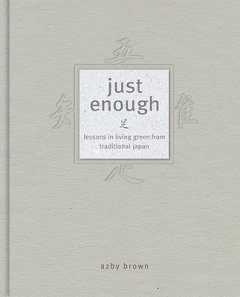If you’re like me when I started reading this book, at first you might find it odd that author Azby Brown looks back several hundred years to a vanished way of life for answers to our current environmental problems. But the Japan of the Edo Period (1603-1868) experienced unprecedented population growth: from 12 million at start, to 30 million at close. An almost completely isolated society, Japan had to make due with its own resources, which were threatened with many of the issues we now face: deforestation, impure water, and shortages of food and fuel.
How Edo Japan marshaled traditional technology and traditional values to create a nearly zero-waste society is the story of Just Enough. He recreates a representative day in the life from the three main classes of Japan at the time (peasants, merchants, ruling samurai) and examines how citizens organized their work and their homes, often with ingenious sustainability. A striking example of Edo Japan’s achievement is that at one time Tokyo boasted a tree canopy covering 80% of the city! Brown closes each story with some thoughts on how the lessons of the time might be applied today. Brown’s book is also rich with detailed sketches of house plans, tools, and ecosystems. How to create a zero waste society based on past society successes– now that is a worthy living green read.



